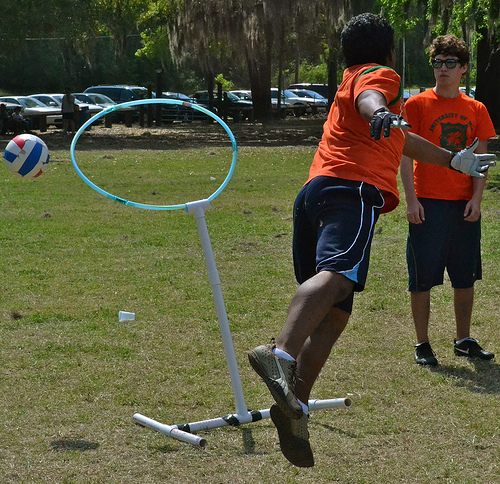USF can now add Quidditch to its very active sports community. The sport, popularized by J.K. Rowling’s “Harry Potter” novels, spawned an International Quidditch Association spanning 800 registered teams across the world.
Zach Cornett and Lindsay Fussell founded USF Quidditch.
“Lindsay heard about it from down at Ringling,” Cornett said. “They helped her start it. We started around early January. So we’re a very young team.”
“It was more like peer pressure from of my friends who did commentary at the World Cup,” Fussell said. “I grabbed my friend Zach because I knew he was instrumental in helping me do anything.”
The sport’s popularity took a life of its own. The state of Florida has college teams from the University of Florida, the University of Miami and Ringling College of the Arts.
“We’ve had players that are huge fans of Harry Potter, but we also have players who never read the books,” Cornett said. “They just play because they love playing the sport.”
“Anytime you’re learning a new sport can be difficult. When we first started, we had six people,” team captain Scott Thomas said. “So it was trying to overcome that hurdle. It took probably a few weeks to get acclimated to the sport. I get psyched up before the game by running.”
Thomas’ primary position is chaser.
“We tell each player to practice two separate positions and so that way we can have a bit more flexibility during matches,” Thomas said. “My alternative position is keeper.”
Fussell said the key to physically prepare for a game is to stretch.
“I never thought I meet so many people who love ‘Harry Potter,’ ” Fussell said. “I see people who are very athletic who I never thought who like the books. I’m a Slytherin. I play very dirty. I play very rough. I will not hesitate to knock you down. I’m the only ‘Slytherin’ captain in the state of Florida.
The rulebook is about 55 pages long, and can be found on the International Quidditch Association’s website at www.internationalquidditch.org/rules.html.
“Obviously, we’re not flying,” Cornett said. “We do use brooms as they do in the books. The robes are optional. You actually wear a cape if you so feel. There are seven players on each side—three chasers, two beaters, a seeker and a keeper. Obviously [as a chaser] you take the quaffle and you score through the hoop while the beaters try to stop them, while the seekers run around off the pitch and they chase after the golden snitch.”
Each goal is worth 10 points. The snitch is worth 30 points and the game ends when the snitch is pulled.
“In tournament style in the interest of time, matches are usually given a time limit,” Cornett said. “In pure Quidditch, the match isn’t over until the snitch is caught. Matches can go anywhere from three to four minutes to 45 minutes. It depends on a lot of different things. Usually the average is about 15 to 20 minutes. The average during World Cup is around 11 minutes.”
Cornett said the golden snitch has a wide set of boundaries to have enough room to run and hide from the seekers, but the boundaries are predetermined before every tournament by the head referee.
“The regular field is small—150 by 140 feet—whereas the last tournament we played, the snitch had literally a city block to hide and run in,” Cornett said. “An entire block essentially. What we usually do is that we take a walk within the boundaries with the captains, seekers, snitches and tell them where they can and can’t go.”
Cornett said the beaters usually hold the key of controlling the flow of the game.
“If you have good bludger control, you can pretty much stop anyone pretty much anywhere you want them to be,” Cornett said. “We usually use a kickball which are the bludgers. They can hit anyone but they generally go for the chasers with the quaffle, which is the volleyball, to stop them from scoring through the hoops.”
The referee usually gives a warning for minor infractions. For major infractions, the rules are like soccer, with two yellow cards then a red card for ejection.
“It’s a very athletic and very physical sport,” Cornett said. “It’s full tackle and full contact, so it’s not for the faint of heart. You need to be able to run and sprint long distances at a very short notice. You need to be a good shot with throwing the ball. The most important thing that we found is that you need to be good in a team. You need to have good teamwork and if one person isn’t performing well, the whole team suffers.”
USF placed third in the Swamp Cup for the southeast regional. The team is currently trying to raise funds to go to New York City in November for the World Cup.
“It hasn’t been easy to get funds to get to New York,” Cornett said. “We have just started, but it’s going well. We have a couple of leads. We’re going to talk to the other teams to see how they work and how we can work together. There isn’t a doubt in my mind that USF is going.”
Story by Tom Chang, online editor Spring ’10
Image by Flickr user gilmorec




Ha! Nice. I’ve never watched the Harry Potter movies, but there’s a reference to this game in Get Him to the Greek. So, very interesting.